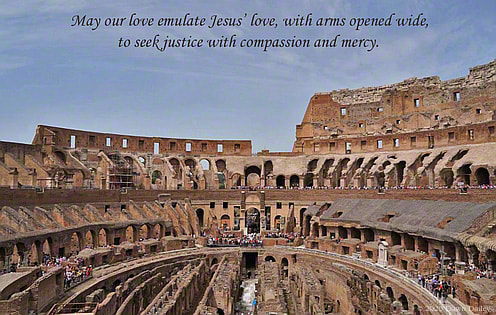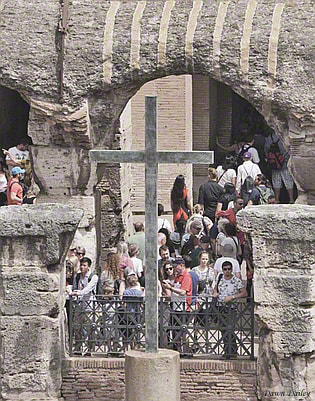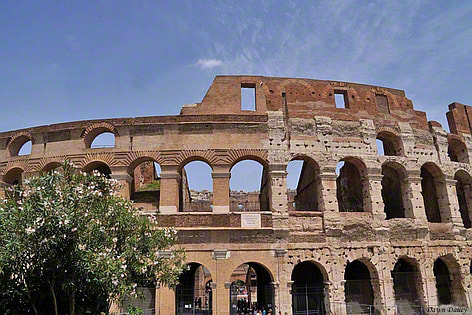Surrounded by stones of brown and beige constructed into several levels, I stand in the middle of an icon, where crumbling walls bear witness to drama through the ages. The Colosseum in Rome is a massive structure symbolic of Italy itself. Built in the 1st century to seat over 80,000 spectators, thousands of commoners as well as a few emperors came here to see, and perhaps to be seen. Gladiators wanting to make a name for themselves fought here. Hunters killed wild animals for sport within these walls. But there were other kinds of entertainment, too. During breaks in the main program, common criminals were forced into the area, naked and unarmed, to face wild animals that would literally tear them to pieces. Some of those “criminals” were Christians whose crimes were simply not worshiping the Roman gods.
As I wander around the Colosseum with camera in tow, my lens brings into focus a simple cross. Juxtaposed against this historic backdrop, the cross initially seems out of place. While the cross is an instrument of cruel punishment, it is also a symbol of the power of Jesus’ resurrection. As I ponder this cross situated to memorialize those martyred Christians, I wonder how people could watch, and even applaud, as someone was being torn to pieces by a lion. But more importantly, how do we respond to brutality in our world today?
Religious persecution is not confined to 1st century Rome. According to opendoorsusa.org, today 245 million Christians suffer persecution for their faith around the world. One in nine believers experience high levels of persecution. And that doesn’t even include people of other religions who are also punished for their faith. Clearly, religious persecution is still an issue today. Yet the Church Universal is largely silent. How do we acknowledge the issue and how do we respond?
Oppression is not limited to persecution. In the Roman world, slavery was the number one business as the Romans routinely conquered, captured, and enslaved their enemies. I wonder how many times God’s heart has broken over the brutality and inequality regarding slavery throughout the ages. How often does His heart break now for those forty million souls trapped in modern slavery, including those in forced labor and those being sex trafficked?
Perhaps another form of oppression is the most silent epidemic of all: domestic abuse and violence. The National Coalition Against Domestic Violence (NCADV) defines domestic violence as “the willful intimidation, physical assault, battery, sexual assault, and/or other abusive behavior as part of a systematic pattern of power and control perpetrated by one intimate partner against another.” According to the NCADV, 20 people experience domestic violence every 9 seconds in the US. That’s 10 million people annually. And one third of all female murder victims are killed by an intimate partner.
Abuse is not limited to physical assault. Abuse can be verbal, psychological, emotional, or spiritual. It is about power and control. Today, 25% of all marriages, including Christian marriages, are abusive on some level. Lest we think it can never happen to us, abuse does not discriminate. Anyone, regardless of race, religion, gender, or socio-economic status, can become the victim of abuse.
Why is abuse so rampant? The victims are mostly (not always) women who often lack the power and the economic resources to escape their perpetrators. Why are churches reluctant to talk about it? Many times, it’s considered a “private matter”, a family issue.
In our key verse today, we see the Israelites “going through the motions” of their faith. Their prayers and sacrifices to God ring hollow and God calls them out. He judges them for giving Him only lip service and demands they strive for justice, mercy, and compassion.
How do we fight for justice with mercy and compassion? A good place to start is to become informed. Numerous websites and organizations have information that can open our eyes to these global and local issues. But information alone is not enough. Compassion motivates us to respond with mercy and justice. How do we develop compassion? This profound quote from Bob Pierce, founder of World Vision International, is both convicting and motivating: “Let my heart be broken by the things that break the heart of God.”
When we choose to gain knowledge of the issues around us and choose to see the world through God’s eyes, then the Holy Spirit can empower us to respond with compassion, mercy and justice. We can put our faith into action by praying for those who are persecuted, enslaved, or abused. We can give our time and money to worthwhile ministries that strive to help the oppressed. By doing so, we can share the love of Christ and the hope of the Cross to those who are suffering within our communities and beyond.
As I think back on that lone cross in the Colosseum, I’m reminded that Jesus, with arms opened wide, hung on the Cross, so that all of us might enter into a relationship with God. His love stretches through time and space to those victimized through persecution, slavery, and abuse. May our love emulate His, with arms opened wide, to embrace all people, to stand up for what is true and right, to seek justice, to help the oppressed, and to defend the powerless. Let’s don’t just go through the motions of our faith. Let’s put our faith into action today.
Father God, how Your heart must break with the sufferings of this world. Break my heart with what breaks Yours. Teach me compassion and help me act on that compassion by showing justice, mercy, and love. Do not let my faith be hollow words but actions that make a difference for good in the sufferings of others. Amen.
NOTE: There are many organizations that fight religious persecution, modern-day slavery, sex trafficking, and domestic abuse and violence. Here are several national and international organizations to help you become more informed.
Re religious persecution:
International Christian Concern (ICC) – find them at https://www.persecution.org/
Open Doors USA at https://www.opendoorsusa.org/christian-persecution/
Re slavery and sex trafficking: International Justice Mission at https://www.ijm.org/.
Re domestic abuse and violence:
National Coalition Against Domestic Violence (NCADV) - https://www.ncadv.org/ (Note that NCADV has a “safe exit” button on their website so browsing history to this site cannot be tracked.)
If you or someone you know is experiencing domestic abuse, the National Domestic Violence confidential hotline is 1-800-799-SAFE (7233) and their website is https://www.thehotline.org/.
ADDITIONAL NOTE: If you are concerned about the fiscal responsibility of these or other charitable organizations, check out Charity Navigator to see info and ratings at https://www.charitynavigator.org/.
Want to subscribe to future posts? Click here.
Text and photographs copyright © 2020 by Dawn Dailey. All rights reserved. Photos of the Colosseum, Rome, Italy.
All scripture quotations, unless otherwise indicated, are taken from the Holy Bible, New International Version®, NIV®. Copyright ©1973, 1978, 1984, 2011 by Biblica, Inc.™ Used by permission of Zondervan. All rights reserved worldwide. www.zondervan.com The “NIV” and “New International Version” are trademarks registered in the United States Patent and Trademark Office by Biblica, Inc.™
A cross at the Colosseum:



 RSS Feed
RSS Feed